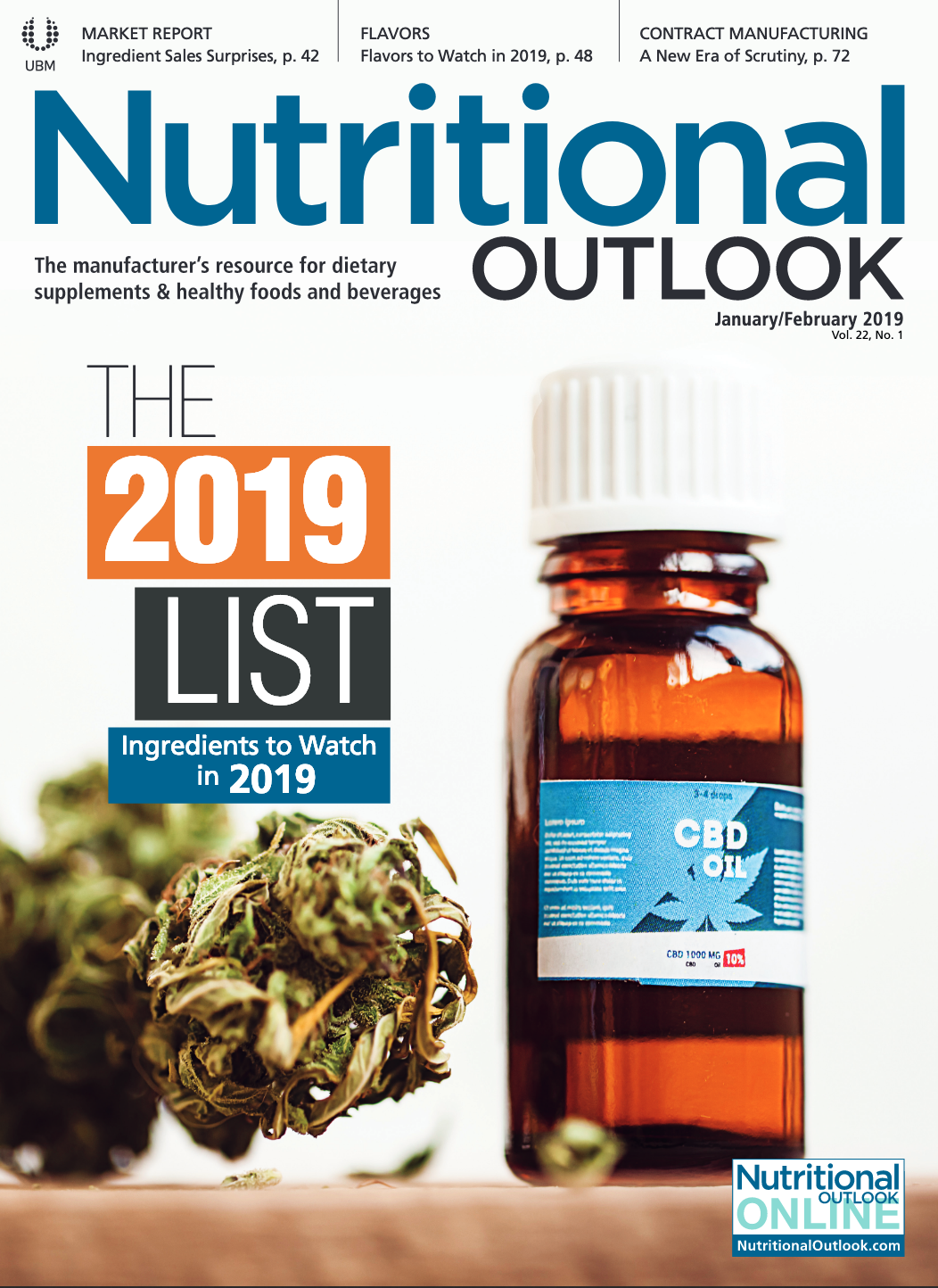2019 Ingredient trends to watch for food, drinks, and dietary supplements: Collagen
Manufacturers are casting a wider net for collagen, spanning beauty and joint health to sports nutrition.
Photo © AdobeStock.com/Alexander Ruiz

Beauty is something we all strive for whether one likes to admit it or not. Good skin and healthy hair are key ambitions driving consumers of all ages to collagen. Collagen has become an important ingredient dominating the nutricosmetic space. According to SPINS, in the hair, skin, and nail category, collagen ingredient sales increased by 28.4% to over $27 million in the conventional multioutlet channel in the 52 weeks ending November 4, 2018, while sales increased 93% in the natural channel to $13.9 million and 112% in the specialty food channel to $266,657.
Collagen has long been an important ingredient in the hair, skin, and nails category. “Nutricosmetics was a new, buzzy word used back in 2011, yet collagen has been used in the cosmeceutical industry since 1985,” explains Ann Marie Montgomery, vice president of Longevity by Nature/Joy of Health, owned by Certified Nutraceuticals (Pauma Valley, CA). However, a lot has changed since 1985, and even since 2011. The continued upward trajectory of this ingredient has a lot to do with innovation as some consumers move away from traditional supplements. Water-soluble, powdered collagen, for example, provides a great deal of convenience and even allows consumers to incorporate collagen in home-cooked meals.
In many ways, collagen has also become a high-end specialty ingredient. For example, the YouTheory supplements brand has partnered with high-end lifestyle e-retailer Goop to sell on-the-go collagen packets. This partnership is a good representation of the transition collagen is making, from targeting club-store achy joints and healthy-aging supplements to now being sought after as a luxury boutique beauty product. In December 2018, at a party in the Goop Gift Popup shop, YouTheory was even able to showcase its collagen in hot chocolate, cocktails, and cinnamon cupcakes baked by Candace Nelson, the founder of the trendy Sprinkles Cupcakes bakery chain. Collagen manufacturers are effectively tapping into social media, influencer marketing, and youth culture.
However, one should not ignore collagen’s athletic side. Joint health, while associated with aging, is at its core about mobility and fitness. A great deal of innovation happening in collagen is taking place in joint health-specifically sports nutrition and recovery-again reframing the ingredient to a younger audience.
There may be another reason to refocus collagen to sports nutrition; sales are falling for most ingredients in the joint-health category. This is particularly true in the conventional multioutlet channel, where SPINS saw nine of the top-ten-selling joint-health ingredients, including collagen, experienced a decline in sales in the 52 weeks ending November 4, 2018. In the natural channel, collagen in the joint-health category managed to increase in sales by 29.6%, while mainstays like glucosamine and chondroitin experienced a small decline in sales.
Casting a wider net only benefits collagen manufacturers, and they are actively formulating and conducting research to make the appropriate claims and attract brand owners.
“We are also still supplying towards beauty and the broad holistic purposes, but we see there is a big growth within sports nutrition,” explains Frank Engel, global marketing development manager for Rousselot (Mukwonago, WI). Rousselot recently conducted a double-blind, randomized, placebo-controlled trial on its Peptan collagen peptide ingredient to validate its use in sports recovery. The yet-to-be-published study found that men who supplemented with Peptan had significantly less perceived muscle soreness and faster recovery 48 hours after doing 150 drop jumps, when compared to placebo, the company says.
“Sports nutrition is getting more popular, and the group of people who want sports nutrition is broadening,” continues Engel, “including weekend warriors, for example-people who are not actually exercising for an athletic event but simply to maintain their bodies.” This means supporting bone, cartilage, muscle, and tendon health to make athletes more efficient and the everyday person more capable of keeping an exercise routine.
“The rub here with sports nutrition is that it’s about being active, and that also has negative effects, so overuse, wear-that’s where collagen supplementation really makes sense,” says Lara Niemann, marketing director for Gelita (Sergeant Bluff, IA), which manufactures collagen peptides that target specific areas of the body. “30% of the body’s protein is collagen. Intuitively, it makes sense” to supplement with collagen, she says, calling collagen “a holistic approach to the musculoskeletal story.”
Whatever the positioning of the product, collagen supplementation still ties back to looking better and being healthier. “Even in the world of sports nutrition, people care about how they look,” says Niemann, describing findings of a Gelita focus groups. “They want to be healthy, but they also care about how their body looks, which then translates to their skin. So, it was interesting in this focus group work: although we were talking about mobility and core strength and muscle strength, we heard a lot of ‘We want to look good,’ and they’re talking about the beauty aspect.”
2019 Ingredient Trends to Watch for Food, Drinks, and Dietary Supplements:
- Collagen

Prinova acquires Aplinova to further increase its footprint in Latin America
April 7th 2025Prinova has recently announced the acquisition of Brazilian ingredients distributor Aplinova, which is a provider of specialty ingredients for a range of market segments that include food, beverage, supplements, and personal care.

























